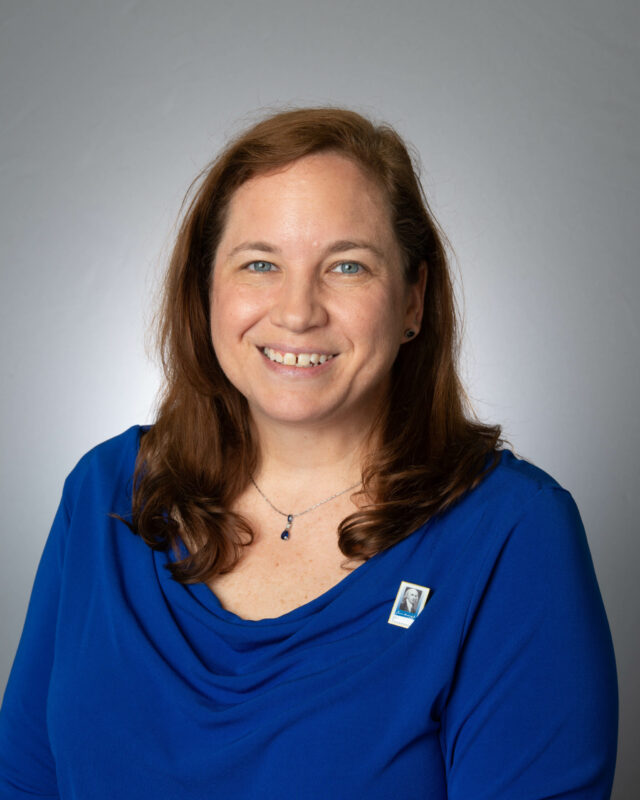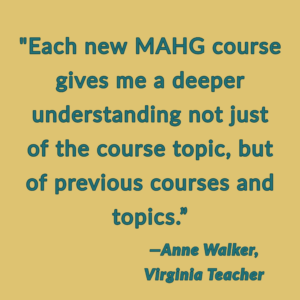Meet Our Teachers
Anne Walker

Anne Walker teaches 7th grade US history and 8th grade civics and economics at Benton Middle School in Manassas, Virginia. She loves her work and takes pride in it. But a recent conversation with a seventh-grader startled her. “We don’t live in a good country, do we?” the student asked. “What do you mean?” Walker responded. “Well, you’re just teaching us all the bad stuff that America has done. When are we going to get to the good stuff?”
“My jaw almost dropped to the floor,” Walker remembered. Why had her attempt to present an honest account of American history led the student to this conclusion?
Addressing Difficult History, Without Getting Discouraged
She told the student that she and he, both white, had benefited from the founders’ assertion of human rights in the Declaration, rights they tried to codify in the Constitution. But not all Americans had benefited to the same degree. The denial of Constitutional rights to enslaved people was a glaring example. Even after emancipation, majorities had passed laws to restrict the ability of minorities to claim their rights.
Yet our system was constructed to allow bad laws to be criticized and revoked. In eighth grade civics, the student would learn about the structure of federal, state, and local government. They’d discuss the ways citizens can make their voices heard.
“I told him, ‘You need to be involved, as you become older and can go out and vote. You need to pay attention to what legislatures, governors, presidents and the courts are doing.’ He was satisfied with that answer—and I think he realized he did have a responsibility,” Walker recalled.
Walker could handle the student’s question because of the trust she’d built with him and his classmates. A less experienced teacher might have learned of the student’s concern in an email from a parent. Walker has not had that experience. “If I ever hear anything from my parents, it’s ‘Thank you for teaching my child that; I never knew how to address it with him.’”
How Walker Has Built Her Content Knowledge
Walker has always loved history. At the beginning of her career, Walker taught 4th grade. Virginia studies is the theme of 4th grade social studies, and Walker designed all class activities around it. She drew readings for English language arts from history and devoted science class to the flora and fauna of the state. Because parents kept requesting their students be placed in Walker’s class, the school departmentalized the fourth-grade curriculum. She began teaching social studies for the entire grade level, while another teacher took over all the math instruction.
 Later, she became certified to teach in secondary school and moved to Benton Middle, where she could focus on history and government. She’d always built her content knowledge through history-based professional development programs. At a program at Stratford Hall (historic home of the Lee family), she learned that a James Madison Fellowship in Constitutional Studies could fund a content-based Masters degree. After applying repeatedly for the single coveted spot offered each year to a teacher from Virginia, she won the award in 2019 and began her Master of Arts in American History and Government at Ashland University.
Later, she became certified to teach in secondary school and moved to Benton Middle, where she could focus on history and government. She’d always built her content knowledge through history-based professional development programs. At a program at Stratford Hall (historic home of the Lee family), she learned that a James Madison Fellowship in Constitutional Studies could fund a content-based Masters degree. After applying repeatedly for the single coveted spot offered each year to a teacher from Virginia, she won the award in 2019 and began her Master of Arts in American History and Government at Ashland University.
She wanted to augment what she felt was her “pretty good grasp of history.” But in her first MAHG course, “I felt like a toddler taking my first steps. I was amazed at how much I didn’t know.”
Her MAHG professors used a “holistic approach.” Her notes for the first course were “full of arrows connecting things.” Each new course has given her “a deeper understanding not just of the course topic, but of previous courses and topics.”
Applying the Holistic Approach of MAHG in the Classroom
Walker began using primary document excerpts when she taught fourth grade. MAHG has widened the range of documents she uses. It has also shown her the reverberating impact of single documents. After taking a MAHG class on the period between the World Wars, Walker repeatedly read sections of the Versailles Treaty to her students, as they studied the global economic depression of the 1930s and the causes of World War II. She read from Annex IV of the Versailles Treaty, in which the Allies list agricultural reparations Germany had to pay to France and Belgium, including “500 stallions . . . 30,000 fillies and mares . . . 90,000 milch cows . . . .”
“Seventh graders are odd animals,” says Walker. They’ve grown comfortable with the usual teacher-student transaction: “Give me a fact, let me memorize it and use it for the test, so I can forget it.” State-mandated learning standards can lead teachers to reinforce this behavior. Teachers “just need to be able to check off having taught the facts.” But MAHG showed Walker that revisiting the same facts deepens understanding. Now, when she reminds students of documents they earlier studied, she sees ideas taking hold. “When a student says, ‘Oh, is that what they meant?’—that’s a teacher high-five moment!”
Walker just completed a MAHG capstone project that traces the realization of civil rights for African Americans in Virginia from about 1640 through the 20th century Civil Rights movement. One lesson plan she prepared uses documentary evidence of a Freedmen’s Village established during the Civil War on the site of present-day Arlington National Cemetery. Walker found a map of the village, requisitions for supplies, records of medical examinations and vaccinations, and letters from officers managing what was essentially a refugee camp for those escaping from slavery to safety behind Union lines. Unlike many other such camps, the village in Arlington grew into a thriving community, only to be cleared in 1900, when government reclaimed the site for cemetery space.
Walker shared documents about the village with her students. “Previously when I taught the Freedmen’s Bureau, I said, ‘It provided food, schooling and medical care.’ Then I moved to the next thing. But my students this year could tell you how the Union army established the villages, and how, later, the government closed those villages and told the freedmen, ‘Go figure it out on your own.’” Now she asks students to think through government’s imperfect response to social problems.
Understanding Constitutional Amendments Through the Jurisprudence
“I feel that MAHG has given me an appreciation for the role of government in our lives that I didn’t have before,” Walker said. She thinks more about the interaction between the Constitution, legislation, and jurisprudence. In her final course in the MAHG program, she is studying the 14th Amendment and its interpretation by the Supreme Court, under Professor Josh Dunn.
Last spring, she studied the First Amendment under Professor Joe Fornieri. At the time, she was teaching online due to COVID protocols, and had leeway to alter the usual lessons in 8th grade civics. “I spent three weeks on First Amendment court rulings. We looked at freedom of speech, especially in the schools.” Later, a parent emailed Walker, saying, “I walked into my child’s room on the day you were doing that lesson, and I stayed. I had never understood freedom of speech in the way you were explaining it.”
Walker’s class were discussing Supreme Court rulings on “hate speech” and protected speech. She asked, “Under the first Amendment, can a teacher wear to school a T-shirt that says ‘Black Lives Matter?’” Students responded, “Sure.” Then she asked whether a teacher could wear a shirt that said “KKK Rocks.” Students exclaimed, “You can’t do that! That’s awful!”
It took further discussion for students to realize that the First Amendment protected even hateful speech. Then Walker explained that within public schools, both statements could be banned. The Court has ruled that the state has a compelling interest to regulate speech that may disrupt the orderly process of education. “Most students seemed relieved to have that particular free speech question taken off their plate,” Walker said. “They were already getting confused talking about speech rights outside of school!”
Just as it was no easy task for the founders to agree on a workable framework for our democratic republic, it is no easy task to study it. Walker’s enthusiasm keeps her students engaged, even as they work through the perplexities.
